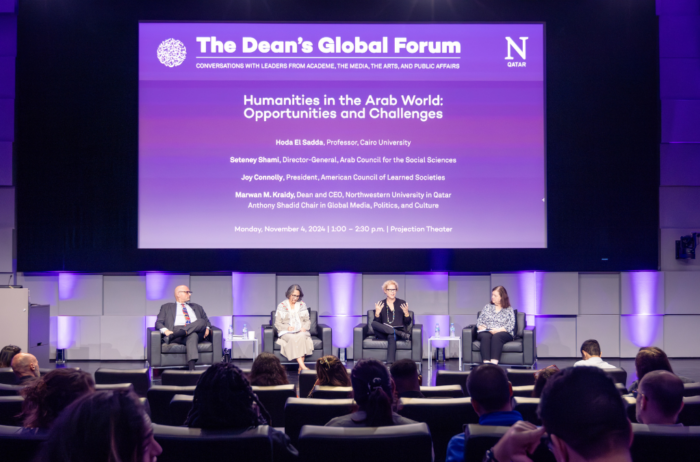ACLS Community Message for November 2024

Greetings to the ACLS community:
It’s commonly argued that studying the humanities and social sciences helps make us better citizens. I agree: I believe that our study creates the knowledge and cultivates the dispositions and habits of thought that help us better understand one another and by extension, determine how to get along together.
Right now, many members of the ACLS community are worried, angry, and fearful—reactions that may well intensify in the coming weeks and years. We’re in a new moment in this country, and we shouldn’t pretend otherwise. What we’re going to make of it is the question. I hope all of us will find or make the common ground that allows us to move forward with confidence and hope, by taking the election as a chance to focus our energies, take stock of our capacities, and galvanize ourselves as a community.
It’s a fact of democratic life, as our 2025 Haskins Prize winner Judith Butler points out, that we don’t choose our fellow citizens. We are not family members or (contra Aristotle) even friends; we scarcely feel like a “we” at all. Yet if we fail to find ways to go on together, we risk allowing our differences to define and isolate us, which will advance already ripe conditions for hatred and harm.
In its essence and at its best, in all its varieties across disciplines, our work as scholars involves at least three processes that help us live in our unchosen democratic company. Doing scholarship, whether we do it in the library, classroom, community, or other places, directs our attention to other human beings, as individuals or in groups. In the process of contemplating texts, artifacts, events, and data—inquiring into what social and aesthetic values affected the writing of a poem or a law, what economic forces shaped this technological innovation or that demographic shift, and so on—we enter into a space of difference from ourselves. The analysis that emerges from this contemplation allows us to offer an informed judgment of human behavior and thought, whether it be about the making of a painting or the definition of race or the design of a constitution.
Without knowledge of what makes us human—our thoughts, languages, and practices, our memories and dreams—we will not sustain the weave of the democratic fabric.
This is one way to describe the significance of our study for democratic life, the value we offer beyond the particulars of the content we preserve and interpret: scholarship directs attention to other human beings, it confronts differences, and it offers informed judgment.
Last week, I started checking the election results in my hotel room in Doha. I had traveled there at the invitation of our new ACLS board chair, Marwan Kraidy, who is the dean and CEO of Northwestern University in Qatar, to talk in a public forum with two colleagues about the state of the humanities and the social sciences in the Arab world. Hoda Elsadda works in Cairo, where she grew up; Seteney Shami currently lives in Amman, since she is unable to stay in her home in Beirut. Of the many things that I learned from them, and among the many reasons I felt humbled by their commitment to their work in the face of violence and upheaval, I was most deeply struck by their unwavering conviction that scholarly study changes public knowledge. With every seminar, lecture, journal article, book, podcast, digital archive, map, interview, and essay, tendrils of understanding and insight are threading through the world, often too slowly, but inexorably.
The production and circulation of knowledge are at heightened risk in the wake of this election. The new administration and its allies will likely seek to enact further cuts in higher education and research, slashing America’s investment in its future. They are already calling for the expansion of legislative bans of inquiry into race and gender. They seek to dismantle efforts to redress historical injustices and exclusion—efforts to make knowledge accessible to all.
Without knowledge of what makes us human—our thoughts, languages, and practices, our memories and dreams—we will not sustain the weave of the democratic fabric. Whatever the new administration may bring, ACLS will stand by its mission to advance and promote knowledge. We will continue to support scholars of all kinds who range freely in all modes and methods across the humanities and social sciences. We will continue to work to diversify the scholarly community. We will continue to work with societies, institutions of higher education, and other groups that foster knowledge creation and communicate knowledge across generations.
A bold collaborative strategy for advocacy for our fields of knowledge is at the center of our priorities for action in the coming five years. In collaboration with many partners, we aim to tell (and help others tell) a powerful story about their value and the importance of investing in them. Whatever your political beliefs, as a member of the ACLS community, you value knowledge. I look forward to working with you in the coming years as we seek to center our studies in the academy and in American society. Please support us, and stay tuned!

Joy
Speech to the Young: Speech to the Progress-Toward (Among them Nora and Henry III)
By Gwendolyn Brooks
Say to them,
say to the down-keepers,
the sun-slappers,
the self-soilers,
the harmony-hushers,
“Even if you are not ready for day
it cannot always be night.”
You will be right.
For that is the hard home-run.
Live not for battles won.
Live not for the-end-of-the-song.
Live in the along.

